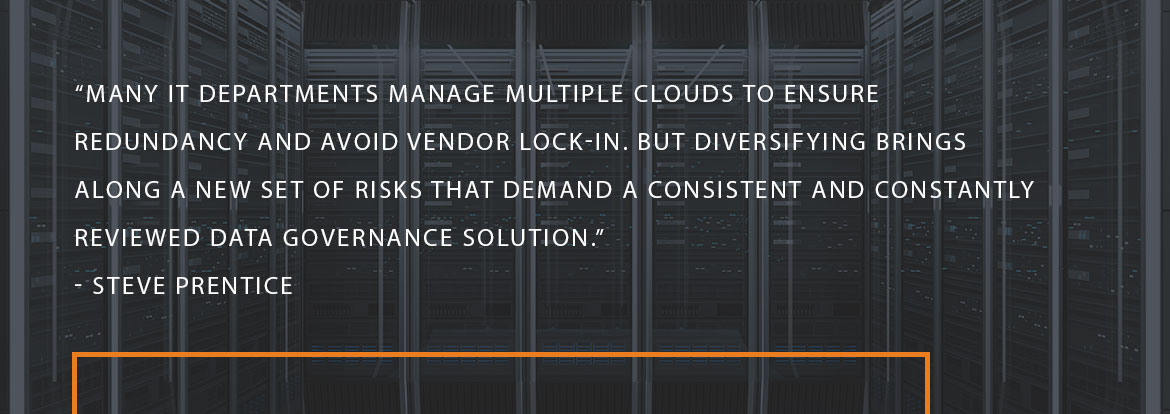The Importance of Data Protection Policies
Recap from the May 7, 2019 CISO/Security Vendor Relationship Podcast
Your data is your responsibility — take control of it. Utilizing multiple cloud services can bring certain organizational benefits, but it can also present new risks. Organizations leverage almost five clouds, on average — making it more critical than ever for leaders to take security into their own hands. Steve Prentice gave more insight in his Cloud Security tip on the latest CISO/Security Vendor Relationship Podcast.

The Cloud Security tip explains that most cloud vendors do not take responsibility for your data security — so it’s up to you to make sure you’re protected by stopping malicious attacks on your organization’s networks and preventing accidental data loss.
Data loss prevention ultimately boils down to identifying confidential data, tracking usage, and preventing unauthorized access to sensitive business assets. According to Ernst and Young, “Data loss prevention is the practice of detecting and preventing confidential data from being ‘leaked’ out of an organization’s boundaries for unauthorized use. Data may be physically or logically removed from the organization either intentionally or unintentionally.” One of the best ways to prevent data loss is by implementing a data protection policy.
How to Implement a Data Protection Policy
If you don’t already have a data protection policy in place, now is the time to create and implement one. Here are a few suggested tips to help you develop a robust data protection policy:
- Identify the types of data you want to protect, based on regulations, sensitivity, etc.
- Establish criteria for evaluating and selecting loss prevention solutions.
- Clearly define the roles everyone will play in your loss prevention.
- Start small, and secure your most critical data first, then expand from there.
- Make sure policies won’t hinder employee efficiency.
- Get a written policy in place as soon as you are able.
- Make sure that your policy takes responsibility for endpoints, networks, and cloud environments.
- Make sure that employees and leaders alike are on-board.
- Conduct regular training to ensure everyone is on the same page.
Policies should also be in place to specifically cover encryption, passwords, acceptable use, email use, and data processing. Your policies are at the heart of how your business operates — your policies explain how employees should handle specific issues, ensuring that everyone is handling sensitive data responsibly.
Components of a Data Protection Policy
It is important to choose trustworthy cloud vendors, but you can’t forget your own security practices and responsibilities once you have moved to the cloud. It is incorrect to think that your cloud vendor will handle all security related issues. It is up to you to secure your endpoints, networks, and cloud environments. Just a few of the must-haves on this list include: It is ultimately up to you to secure your endpoints, networks, and cloud environments. Just a few of the must-haves on this list include:
- Enforcing a consistent set of data loss prevention policies to define how members of your organization can share data, and how they should protect it.
- Limiting user permissions to a “need to know” basis. The general rule of thumb should be: only give people access to what they need. The fewer people accessing different resources, the smaller your margin of error becomes.
- Implementing strong security practices like 2FA, so that two separate identifiers are required for your employees to gain access to a particular account or resource.
- Building a dynamic inventory of applications based on the type of data you.
Wrapping It Up
Creating a data protection policy is something that every organization, regardless of size or industry, should prioritize. It’s unwise to assume that your cloud security vendor is protecting your data — it’s ultimately up to you to make sure that information is being handled responsibly at all organizational levels, and that the cybersecurity infrastructure is equipped to prevent external threats.
As you create and implement a strong data protection policy, make sure to add a secure layer of data access security by implementing the OpenVPN Access Server. OpenVPN Access Server is a mature, award-winning VPN server that provides secure, remote access to data stored in the cloud — ensuring that data is encrypted during transit through the Internet.


